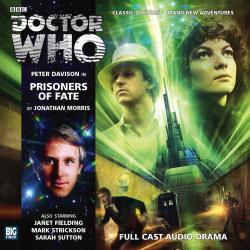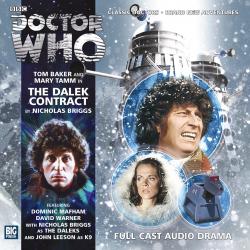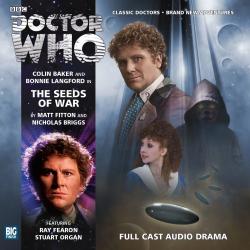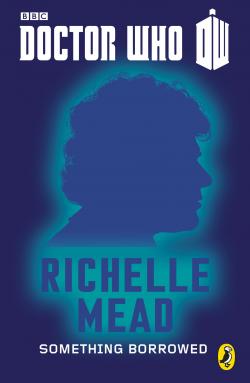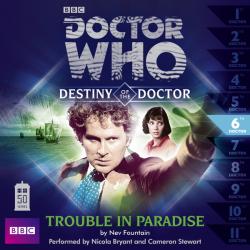UNIT: Dominion (Big Finish)
Monday, 8 July 2013 - Reviewed by

UNIT: Dominion
Released by Big Finish
Written by Nicholas Briggs and Jason Arnopp
Directed by Nicholas Briggs
Released: 2012
When it comes to creating a sense of foreboding in Doctor Who adventures, few do it better than the show’s current helm Steven Moffat - indeed, the section of dialogue above from his enigmatic construct River Song skilfully demonstrates this dramatic ability. Nevertheless, in Jason Arnopp and Nicholas Briggs, scribes of Big Finish’s audio drama UNIT Dominion, the acclaimed showrunner may have yet found his equals. This thrilling Seventh Doctor piece brings across the oncoming darkness of the Time Lord’s subsequent incarnations with powerful effect, lending new emotive and tonal resonance to an often criticised era of the programme.
Dominion does not simply echo the sentiments of Melody Pond tonally, though. In fact, that metaphorically vivid concept of ‘rising higher than ever before’ only to then ‘fall’ on the same scale applies to the structure of this production too. For any listener with even the faintest recollection of Castrovalva, Utopia or other past adventures containing a consistent narrative trend, the central narrative ploy presented here will come neither as a surprise nor as a satisfying development of proceedings. Perhaps it is the curse of the Whovian to anticipate the unexpected with hindsight of fifty years’ worth of stories, yet equally it seems justified to expect today’s Doctor Who writers to innovate with new storylines and shocks, regardless of the format of their episodes.
Looking on the bright side, however, this apt parallel at least highlights the strength of the first three-quarters of the story. While Dominion’s climax is lacklustre to say the very least, those fans of the mind-set that it is the journey rather than the destination itself which defines narrative quality will be pleased to hear that the journey here is sublime. Sylvester McCoy and Alex Macqueen play off one another enthrallingly as the Seventh and a potential future incarnation of the Doctor respectively, their interweaving narrative strands bringing with them a host of intriguing implications in terms of how a Time Lord can become corrupted by their prolonged experiences during their travels.
Indeed, as ever for a Big Finish production such as this, it is the central cast who inevitably shape the pleasures to be found upon an initial listen. Tracey Childs, for instance, makes a spectacular return to the realms of audio adventures, with her ex-Nazi professor Klein rendered in a redemptive new light in her work at UNIT in our universe. The Seventh Doctor’s dilemma regarding Klein and his own hidden agenda surrounding her destiny is fascinating to witness developing as events reach their crescendo, particularly for viewers who joined Doctor Who in the midst of its revival. Here, the listener essentially has the chance to experience a moral conflict not unlike that which David Tennant’s Doctor faced in his swansong, as he witnessed his companion Donna Noble devoid of her memories and the subsequent regret this loss had provoked.
Between cases of mistaken identity, impending invasions and those aforementioned moral dilemmas for the Doctor, it may seem a wonder that Arnopp and Briggs have compounded further companion characters into their mixture. Few could have blamed these two esteemed storytellers for electing to omit Beth Chalmers’ Raine from proceedings should they have so desired. Nevertheless, Raine is here to accompany McCoy’s Doctor into the darkest of days, providing suitable comic relief on infrequent instances while never going so far as to disrupt the effective pseudo-dystopian tone. Those listeners who glimpse the cast list before experiencing Dominion will discover that there’s even appearances awaiting fans from an ex-cohort of the Time Lord, and although this reviewer won’t spoil their identity, sufficed to say these cameo moments are as masterfully handled as the rest of the production.
When it comes to contrasting the innovation and dramatic power of the first three-quarters of Dominion with the predictable nature of its climax, the verdict of course lies with which of these two opposing factors holds the greater favour in tipping the balance. Certainly, the supposed piece de resistance of this proverbial dish, the revelation awaiting the listener as the fourth episode opens, fails to have its desired impact and thus robs the piece of its opportunity to venture beyond the ranks of Big Finish’s greatest works and into the esteemed ranks of Doctor Who’s own Hall of Fame. It seems this is where River’s analogy regarding ‘rising further than ever before’ comes to light, as we can perhaps speculate whether the pride of Arnopp and Briggs in creating an ambitious, screen-worthy piece of audio drama blinded them to the extent of dropping the ball during the final crucial act.
Pride comes before a fall, or so they say. If a moment of pride, hubris and crippling nostalgia contained in Dominion’s final act proves so detrimental, then, do we dub this Big Finish’s ‘darkest hour’? Of course not- the reality is quite the opposite. In fact, in attempting so boldly and (for the majority) successfully to match and surpass the televised adventures of the Doctor, Arnopp and Briggs have defined a terrific new benchmark in UNIT Dominion for future audio and on-screen tales alike. Whether it’s in Macqueen’s brilliantly enigmatic rendition of Theta Sigma, or in the subtler moments where McCoy’s ever-scheming Time Lord is left to contemplate the ramifications of his continued meddling, virtually every moment of this adventure serves as a spectacular indicator of how far this range of ‘classic’ sagas and storylines has come in the past decade.
“Well, then, soldier - how goes the day?” River’s next words to the audience again seem remarkably apt in the case of UNIT Dominion, for above all, this lengthy yet compelling audio drama is a mission statement, a call to arms for Big Finish playwrights to step up their game and rival even Steven Moffat’s televised Doctor Who works. By the time the credits have rolled here, the listener is left in no doubt that if future writers in the range can avoid the solitary ‘fall’ present in this narrative, then subsequent adventures may truly rise ‘higher than ever before’.
